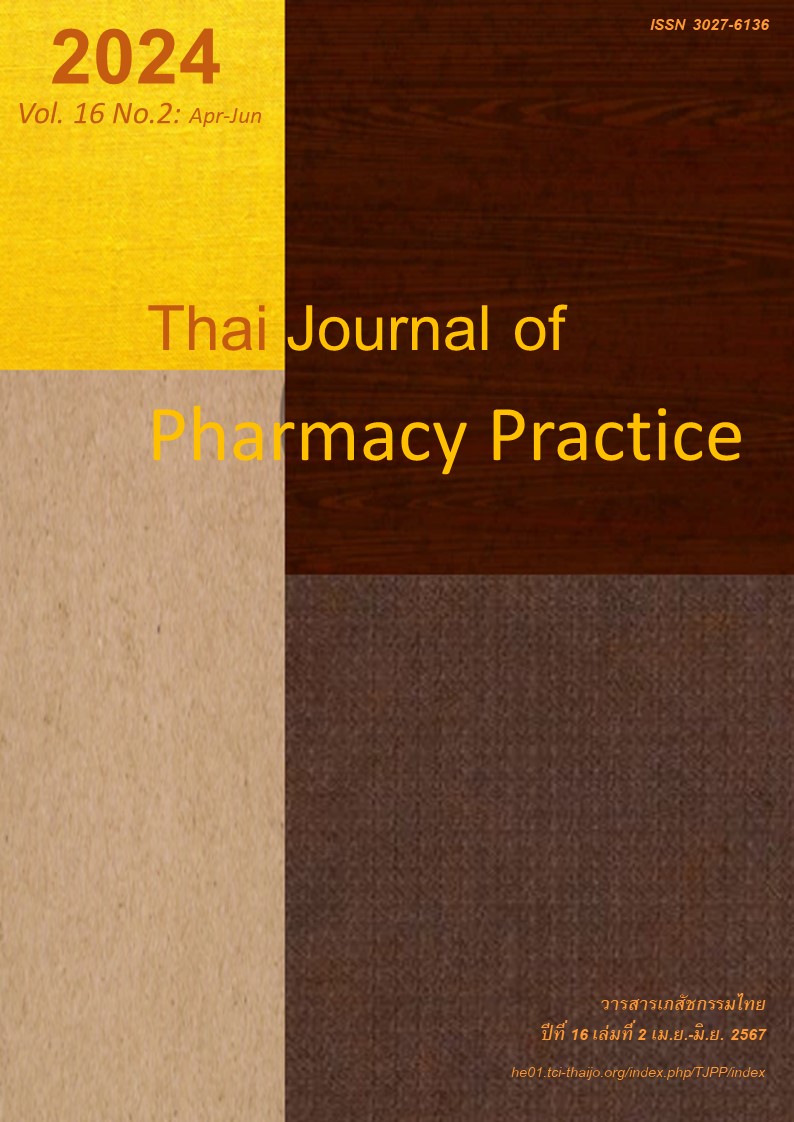ประสิทธิผลของทีมสหสาขาวิชาชีพต่อคุณภาพชีวิตและปัญหาจากการใช้ยาใน ผู้ป่วยโรคเบาหวานและ/หรือความดันโลหิตสูงที่ได้รับการวินิจฉัยเป็นโรคไตเรื้อรัง
Main Article Content
บทคัดย่อ
วัตถุประสงค์: เพื่อประเมินคุณภาพชีวิตและปัญหาการใช้ยาของผู้ป่วยที่ได้รับการดูแลจากคลินิกโรคไตเรื้อรังโดยทีมสหสาขาวิชาชีพ โดยมีเภสัชกรให้คำแนะนำเรื่องยาและการดูแลตนเองเพื่อควบคุมปัจจัยเสี่ยงของโรค ตลอดจนค้นหาปัญหาจากการใช้ยา วิธีการ: การศึกษาส่วนแรกเป็นการวิจัยเชิงพรรณนาแบบเก็บข้อมูลไปข้างหน้าเพื่อรวบรวมปัญหาจากการใช้ยาและคุณภาพชีวิตในผู้ป่วยโรคไตก่อนเข้ารับการดูแลจากคลินิกโรคไตเรื้อรัง การศึกษาส่วนที่สองเป็นการวิจัยกึ่งทดลองเพื่อประเมินการเปลี่ยนแปลงของคุณภาพชีวิตในผู้ป่วยที่เข้ารับการรักษาในคลินิกโรคไตเรื้อรังโดยทีมสหสาขาวิชาชีพ ตัวแปรหลักที่ใช้ในการศึกษา คือ ปัญหาจากการใช้ยาและคุณภาพชีวิตซึ่งวัดโดยแบบประเมิน EQ-5D-5L ผลการวิจัย: ตัวอย่างเป็นผู้ป่วยโรคไตเรื้อรัง จำนวน 234 คน อายุเฉลี่ย 64.53±10.12 ปี ผู้ป่วยส่วนใหญ่มีโรคประจำตัวเป็นโรคความดันโลหิตสูง พบปัญหาจากการใช้ยาทั้งสิ้น 134 ปัญหาในผู้ป่วยโรคไตเรื้อรังระยะที่ 1-2 ปัญหาที่พบส่วนใหญ่ คือ ผู้ป่วยใช้/รับประทานยาน้อยกว่าแพทย์สั่งหรือไม่ได้รับประทานยา (ร้อยละ 77.61) การศึกษาแก้ไขปัญหาที่ตัวผู้ป่วยหรือผู้ดูแลโดยการให้คำปรึกษาด้านยาเป็นหลัก ส่วนใหญ่คำแนะนำในการแก้ไขปัญหาได้รับการยอมรับและดำเนินการตามทั้งหมด ผลลัพธ์ของการจัดการปัญหา คือ ปัญหาส่วนใหญ่ได้รับการแก้ไข ค่าเฉลี่ยคะแนนอรรถประโยชน์ของผู้ป่วยโรคไตเรื้อรังก่อนเข้าร่วมการศึกษาเท่ากับ 0.9526±0.0617 ในเวลา 3 เดือน ผู้ป่วยโรคไตระยะที่ 3a-3b และ 4-5 มีค่าอรรถประโยชน์สูงขึ้นอย่างมีนัยสำคัญทางสถิติ (P=0.044 และ <0.001 ตามลำดับ) และที่ 6 เดือน ผู้ป่วยโรคไตระยะที่ 4-5 ที่มีค่าอรรถประโยชน์ดีขึ้นอย่างมีนัยสำคัญทางสถิติ (P=0.005) สรุป: การให้คำแนะนำดูแลผู้ป่วยโรคไตโดยเภสัชกรร่วมกับทีมสหสาขาวิชาชีพในคลินิกโรคไตเรื้อรังสามารถแก้ไขปัญหาเรื่องการใช้ยาและสามารถเพิ่มคะแนนอรรถประโยชน์ในผู้ป่วยโรคไตระยะที่ 3-5 ได้อย่างมีนัยสำคัญทางสถิติ
Article Details

อนุญาตภายใต้เงื่อนไข Creative Commons Attribution-NonCommercial-NoDerivatives 4.0 International License.
ผลการวิจัยและความคิดเห็นที่ปรากฏในบทความถือเป็นความคิดเห็นและอยู่ในความรับผิดชอบของผู้นิพนธ์ มิใช่ความเห็นหรือความรับผิดชอบของกองบรรณาธิการ หรือคณะเภสัชศาสตร์ มหาวิทยาลัยสงขลานครินทร์ ทั้งนี้ไม่รวมความผิดพลาดอันเกิดจากการพิมพ์ บทความที่ได้รับการเผยแพร่โดยวารสารเภสัชกรรมไทยถือเป็นสิทธิ์ของวารสารฯ
เอกสารอ้างอิง
Yeesunkaew R, Na Nongkhai Y, Shayakul C, Sujira rat D. Quality of life in end state renal receiving hemodialysis according to the different health benefit schemes: A private hospital case study. Vajira Nursing Journal. 2018; 18: 79–88.
Eknoyan G, Lameire N, Eckardt KU. Clinical practice guideline for the evaluation and management of chronic kidney disease KDIGO 2012 clinical practice guideline for the evaluation and management of chronic kidney disease. Kidney Int Suppl. 2013; 3: 1470–3.
Thanakitjaru P. Current situation of chronic kidney disease in Thailand. Journal of the Department of Medical Services. 2015; 40: 5–17.
Ingsathit A, Thakkinstian A, Chaiprasert A, Sangtha wan P, Gojaseni P, Kiattisunthorn K, et al. Preva- lence and risk factors of chronic kidney disease in the Thai adult population: Thai SEEK study. Nephrol Dial Transplant. 2010; 25: 1567–75.
Cha’on U, Tippayawat P, Sae-ung N, Pinlaor P, Siri thanaphol W, Theeranut A, et al. High prevalence of chronic kidney disease and its related risk factors in rural areas of Northeast Thailand. Sci Rep. 2022 28; 12: 18188. doi.org/10.1038/s41598-022-22538-w
Steinman MA, Miao Y, Boscardin WJ, Komaiko KDR, Schwartz JB. Prescribing quality in older veterans: a multifocal approach. J Gen Intern Med. 2014; 29: 1379–86.
Phromkamdang K, Sirilak T. Effects of pharmaceuti- cal care on clinical outcomes in patients with chronic kidney disease in Wiang Haeng Hospital, Chiang Mai province. Journal of Nursing and Public Health Research. 2023; 3: 1–19.
Sawatpanich J. Primary pharmaceutical care services among patients with chronic kidney disease Kantharawichai Hospital, Mahasarakham province. Research and Development Health System Journal 2014; 7: 57–63.
Chaiyasung P, Jukchai P, Sridet R, Nanudorn A. The development of self-care promotion program on behavior self-care of chronic disease patients with chronic kidney disease at home. Journal of Nursing and Education. 2020;13: 27–42.
Rattanachotphanit T, Waleekhachonloet O, Chana sopon S, Ausornsagiam W, Kanjanasilp J, Suwatta nasilp A, et al. Quality of life and utilities of end stage renal disease patients undergoing dialysis. Isan Journal of Pharmaceutical Sciences. 2018; 14: 88–98.
Yeesunkaew R, Na Nongkhai S, Chayakul C, Sujira rat D. Assessment quality of life in end stage renal disease patients undergoing hemodialysis. Vajira Nursing Journal. 2016; 18: 79–88.
Sutthi C, Sutthi W. Utility and cost assessment of patients with chronic kidney disease stages 3 to 5 at a General hospital. [Independent study]: Mahasara- kham University; 2018.
Chen SH, Tsai YF, Sun CY, Wu IW, Lee CC, Wu MS. The impact of self-management support on the progression of chronic kidney disease--a prospective randomized controlled trial. Nephrol Dial Transplant. 2011; 26: 3560–6.
Pharmaceutical Care Network Europe Foundation. PCNE classification for drug related problems V 8.02 [online]. 2017 [cited Mar 30, 2023]. Available from: www.pcne.org/upload/files/230_PCNE_classification_V8-02.pdf.
Pattanamongkol O, Chantaracha D, Chalongsuk R, Pongchaidecha M, Rungprai D, Muongmee S. The cost-effectiveness of pharmaceutical care to slow progression of the kidney in chronic kidney disease with diabetes patients at Laem Chabang hospital, Chonburi province. Thai Bulletin of Pharmaceutical Sciences. 2018; 13: 53–67.
Srisubat A, Jiamjariyaporn T, Chanpitakkul M, Lees midt V, Wisansak W, Promnim S. Cost-effectiveness of integrated care in patients with chronic kidney disease stage 3 and 4 compared with standard care in rural communities. Journal of the Department of Medical Services. 2017; 42: 54–63.
Ali B, Gray-Vickrey P. Limiting the damage from acute kidney injury. Nursing (Brux). 2011; 41: 22–31
Champati S. Causes of patient’s medication problems and interventions in home care visits by pharmacists. Thai Journal of Clinical Pharmacy 2017; 23: 1-9
Steinman MA, Miao Y, Boscardin WJ, Komaiko KDR, Schwartz JB. Prescribing quality in older veterans: a multifocal approach. J Gen Intern Med 2014; 29: 1379–86.
Narvekar RS, Bhandare NN, Gouveia JJ, Bhandare PN. Utilization pattern of potentially inappropriate medications in geriatric patients in a tertiary care hospital: a retrospective observational study. J Clin Diagn Res. 2017 11: FC04–8.
Via-Sosa MA, Lopes N, March M. Effectiveness of a drug dosing service provided by community pharmacists in polymedicated elderly patients with renal impairment--a comparative study. BMC Fam Pract. 2013; 14: 96. doi.org/10.1186/1471-2296-14-96.
Hoffmann F, Boeschen D, Dörks M, Herget-Rosen thal S, Petersen J, Schmiemann G. Renal insuffi- ciency and medication in nursing home residents. a cross-sectional study (IMREN). Dtsch Arztebl Int. 2016; 113: 92–8.
Chang F, O’Hare AM, Miao Y, Steinman MA. Use of renally inappropriate medications in older veterans: a national study. J Am Geriatr Soc. 2015; 63: 2290–7.
Breton G, Froissart M, Janus N, Launay-Vacher V, Berr C, Tzourio C, et al. Inappropriate drug use and mortality in community-dwelling elderly with impaired kidney function--the Three-City population-based study. Nephrol Dial Transplant. 2011; 26: 2852–9.
Papaioannou A, Clarke JA, Campbell G, Bédard M. Assessment of adherence to renal dosing guidelines in long-term care facilities. J Am Geriatr Soc. 2000; 48: 1470–3.
Chanpitakkul M. The effect of integrated care on the health related quality of life in CKD patients: a community hospital approach. In: Tangsanga K, editor. Workshop on “The development of a care model for patients with chronic kidney disease by a multidisciplinary team of the district hospital and by a community nurse of the Tambon Health Promoting Hospital” Bhumirajanagarindra Kidney Institute; 2019 . p. 41–9.


